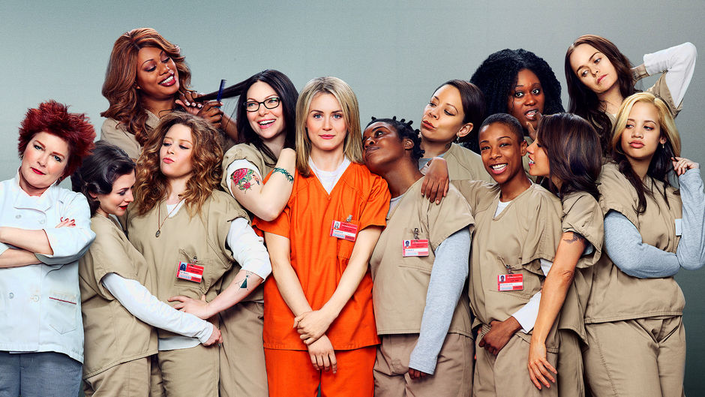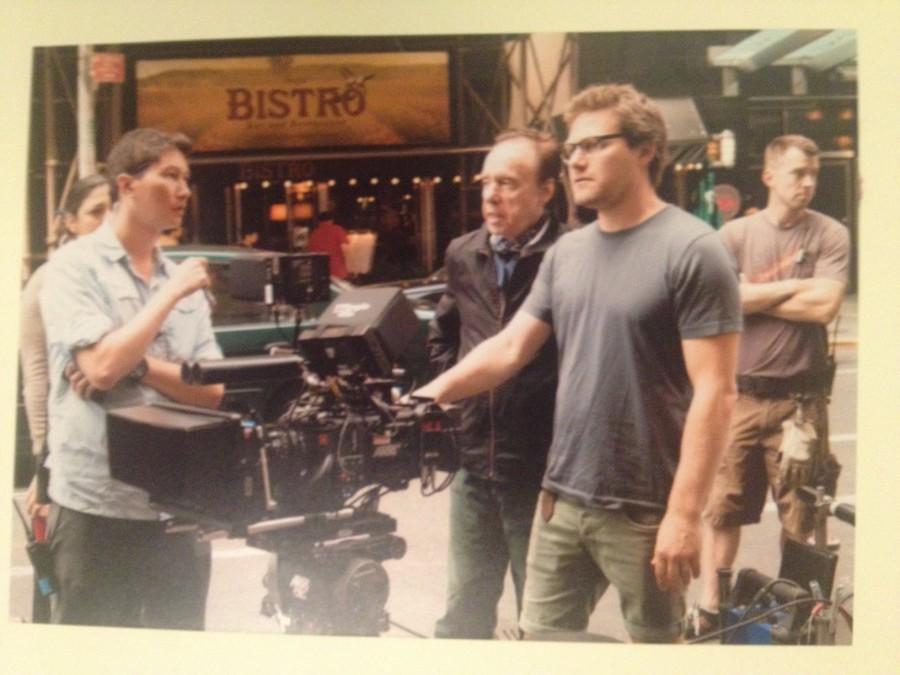Audiences held captive by Orange is the New Black
Cast of “Orange is the New Black”
September 10, 2014
A self-professed good girl and her drug running ex girlfriend, an ex mafiosa, and a transgendered hairdresser. Is this the setup for a Lifetime sitcom? No, it’s Orange is the New Black, America’s new favorite prison drama.
Ever since its second season was released in June, Orange is the New Black, a dramatic series about life in a female prison, has become a pop culture phenomenon. Whether it be praise or scorn, it seems like everyone is talking about this show. One would think that a show about criminals in a prison wouldn’t garner so much attention. So, why is a show about convicted felons so appealing? The answer reveals a lot about ourselves.
Orange is the New Black is a Netflix original series about a woman named Piper Chapman, an upper middle class woman living in New York City, who is required to serve a fifteen month sentence in an all women’s prison. Her crime, transporting a suitcase of drug money to her ex-girlfriend, occurred about ten years before the start of the series. In the time between her crime and her sentencing, Piper has lived a quiet life with her fiancé, Larry. The show revolves around her struggles and relationships with the other inmates.
Believe it or not, the plot of Orange is the New Black is not necessarily a new idea. Hollywood is saturated with films that strike the same chord. In the Shawshank Redemption, an innocent man is sent to prison and finds that he doesn’t belong there, feeling in the end that he must escape. In Cool Hand Luke, an Army veteran is sent to work in a Florida chain gang, but has trouble assimilating. In Brubaker, a well intentioned warden disguises himself as a prisoner as a means of uncovering sexual abuse, corruption, and fraud.
For those who have seen Orange is the New Black, these are all familiar scenarios. All these plots follow a similar thread; an outsider is brought to a prison and feels overwhelmed. Seeing this, I have to ask myself, why are we so obsessed with prison dramas? In an interview, Oakdale High senior Dylan Powell said, “Prison is a big part of American society, for better or worse.” I think Dylan might be on to something.
We live in a strange time. Although crime rates have been going down, the rate of incarceration has risen exponentially. In 2012, 2,266,800 adults were considered incarcerated according to Department of Justice statistics, almost one percent of the US adult population. One in six Hispanic men and one in three black men will spend time in a correctional facility. Evidently, it’s becoming common to know at least one person who’s in prison.
It takes knowing someone in prison and it takes understanding to accept that the people in these institutions are still people. “I think [the show] is so popular because it gives middle class kids like us a chance to experience the very real struggle of people who didn’t have the same opportunities as us. Like, even though they made bad choices, they aren’t evil because of it,” said Oakdale High junior Connor Marsh.
Connor makes a good point. In many episodes of Orange is the New Black, we’re shown the background of a certain character, or their context. In one episode, we learn about the background of Sophia, a trans-woman who serves as the resident hairdresser and educator in the prison. We get insight on her gender identity disorder and her estranged relationship with her son and wife. In another, we learn about Crazy Eyes’ learning disability and the damage her overbearing mother put on her, which causes her to have a meltdown in prison. In season two, we learn about Taystee’s life in Harlem, where she wanted to improve her life by getting a job, but she kept getting pushed by her mother and her friends to deal drugs.
Even Piper, who is essentially an outsider, has to deal with the dissolution of her engagement to Larry and the resurgence of her feelings for her ex-girlfriend, Alex Voss. Many of the characters are haunted by a past where the circumstances of their very existence made them turn to crime to survive. Many of them are also wracked with regret as a result.
Although the stories and regrets of the girls don’t justify their crimes, they serve as a reminder that the women locked up in these prisons do exist. Although they’ve done wrong, they’re still people with a story to tell, and we’re eager to listen. That’s why I think Orange is the New Black hangs heavily on our collective consciousness; it’s a show that tears away any preconceived notions and allows the viewer to form his or her own opinion of each character.
When a TV show allows us to level with its characters, it’s not too hard for us to imagine wearing that orange jumpsuit. We feel the pain, heartbreak, regret, injustice, and frustration these women deal with on a daily basis. That kind of empathy is powerful and constructive.
“Everyone loves an underdog story, and these girls are definitely the underdogs. It’s hard not to root for them, even with all their flaws,” said Devin Trapp, and Oakdale High junior.
The third season of Orange is the New Black will premier in June of 2015, and the show’s second assistant director, Steven Lafferty, said in an interview, “No spoilers here, but I have to say, I think everyone will enjoy it.” Look out for the release on Netflix.
Be sure to look for more stories from Erik in the future, when he gives a behind-the-scenes scoop with set 2nd assistant director, Steven Lafferty








Andrew Brown • Sep 11, 2014 at 1:18 pm
What a well-written and opinionated article! This young man looks like he has his head on straight. Such articulation and eloquence comes only once in a generation, and I look forward to hearing more from him.
-Andrew Brown, stay-at-home dad.
Timothy John • Sep 11, 2014 at 1:15 pm
Great article! I wish that I was allowed to watch this show. It’s too adult.